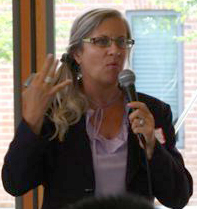I grew up between Colorado and California, and spent much of my teen and early adult years in west coast countercultures. I experimented with the University of California, starting with Berkeley, but finally settled into Wellesley College in 1984. As a Women’s Studies major, I pursued critical alongside creative projects, working with faculty across disciplines – Susan Reverby and Jackie Jones in US women’s history, Bill Cain and the poet Tino Villanueva in English, Jennifer Schirmer, Peter Winn, and the poet Marjorie Agosín in Latin American Studies. On fellowships, I traveled to Sandinista Nicaragua and from research undertaken in 1984-8 produced a memoiristic novella (Letters from the Front), and a long essay about revolutionary motherhood. To tape record the Cabildos Abiertos (nationwide public talks concerning women’s rights and the new constitution), I traveled with military escort into the remote northern regions where the civil war was most active. I have yet to develop fully these taped meetings into a scholarly project. I also wrote stories about California beach life as I had known it before Wellesley, gave literary readings, and for an honor’s thesis in Women’s Studies, wrote a novel, Sunsinger.
I entered the American Civilization program at Brown University in 1988, during the years poststructural thought was remaking the philosophy and practice of history. Am Civ in that period leaned strongly toward training students in U.S. women’s history and historiography. It emphasized histories of race and hosted The Center for the Study of Race and Ethnicity. Equally influential on our graduate discussions were the disorienting implications of poststructuralism for historical method, narrative, analysis. What modes of agency or disciplinary ethics did postructuralism suggest? At Yale University, nearby, a cohort of senior and junior scholars was building what became the New Western History (Howard Lamar, John Faragher, Patty Limerick). I gravitated toward this exciting experiment in public scholarship, inspired by graduate students like Susan Johnson or emerging figures like Peggy Pascoe and Virginia Scharff, whose works spurred my own in cultural and literary studies.
I was eager to return to points relatively more south and west, and when my husband was offered a job doing Chicano literature at Rice University in Houston, his home town, I accompanied him with our infant son. In 1997, I joined the Rice faculty as a lecturer and in 2001, I became Assistant Professor. At Rice, I completed my first book, Landscapes of the New West (1999), engaging the New Western History on issues of narrative and its politics while urging a postmodern analytic be brought to studies of contemporary culture. I participated in seminars at UC Santa Cruz that became The New Western History: An Assessment (1997). The project was named the “best annual special issue” by the MLA and Council of Editors of Learned Journals. My contribution, “Literature, Gender Studies, and the New Western History,” was honored both by the Western Literature Association and the Western Historical Association. In this period I also began new research, conducting oral histories with women surfers and business owners in Santa Cruz. In 1999, I was awarded the WLA’s Don D. Walker Award for Annual Best Essay, for “Revising Western Criticism through Wanda Coleman.” WLA recruited me as young scholar into leadership and, in 2003, I served as WLA President, hosting the annual meeting in Houston with a focus on the new geographies produced by globalization. On a conference field trip to Galveston, colleagues swam in the Gulf, rented surfboards. The day after this group surf and swim in the Gulf, it was a Monday and a few colleagues were still leaving town, I and my husband Professor José Aranda were named Masters of Baker College.
As Baker Master, I was able to emphasize the critical pedagogies I already had established with undergraduates. Work I had been doing in youth cultures and in my Generation X classes found new institutional footholds. I began Baker College Girl Talk as a forum for intergenerational understanding and consciousness-raising. I was also Director of Undergraduate Studies in the English Department. Because of the numbers of students I regularly saw and because I was researching sport and also had sons playing competitive soccer, I reached out to athletes across campus, who, in 2008, made up 75% of the students in my Intro to Women’s/Gender Studies (75 of 100). This particular season was a winning one for the Rice football team which brought home the Conference USA Texas Bowl Cup. I had the challenge and opportunity to have most of the starting players in my class and to conduct conversations about gender, sexuality, intersex, sexism and racism in pop culture and so on, and to advise engaged research final projects related to topics such as “Title IX in Sports” and one asking “Does Having a Girlfriend Make Football Players Less Sexist?”
After six and a half years and seven graduation ceremonies as Master, and after having finished a second book (Surfer Girls in the New World Order) during those Mastering years as well as having been tenured in 2007, I find myself in my life post-Master returning to earlier interests: in the West/Américas, in various genres of writing including creative writing, and in public humanities.
Top of page
